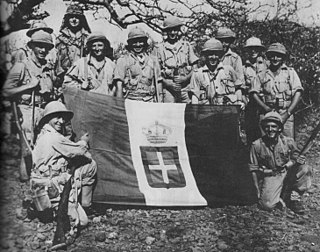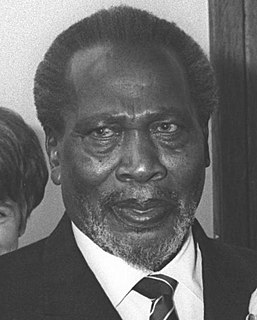 W
WThe Colony and Protectorate of Kenya, commonly known as British Kenya, was part of the British Empire in Africa from 1920 until 1963. It was established when the former East Africa Protectorate was transformed into a British Crown colony in 1920. Technically, the 'Colony of Kenya' referred to the interior lands, while a 16 km (10 mi) coastal strip was the 'Protectorate of Kenya' but the two were controlled as a single administrative unit. The colony came to an end in 1963 when a black majority government was elected for the first time and eventually declared independence as Kenya.
 W
WThe Colony and Protectorate of Kenya, commonly known as British Kenya, was part of the British Empire in Africa from 1920 until 1963. It was established when the former East Africa Protectorate was transformed into a British Crown colony in 1920. Technically, the 'Colony of Kenya' referred to the interior lands, while a 16 km (10 mi) coastal strip was the 'Protectorate of Kenya' but the two were controlled as a single administrative unit. The colony came to an end in 1963 when a black majority government was elected for the first time and eventually declared independence as Kenya.
 W
WThe Colony and Protectorate of Kenya competed in the Summer Olympic Games for the first time at the 1956 Summer Olympics in Melbourne, Australia. 25 competitors, 24 men and 1 woman, took part in 10 events in 4 sports.
 W
WThe Colony and Protectorate of Kenya competed at the 1960 Summer Olympics in Rome, Italy. 27 competitors, all men, took part in 13 events in 4 sports.
 W
WThe 1963 Kenyan general election was held in Kenya Colony between 18 and 26 May 1963. Voters elected members of the House of Representatives and Senate. The election was the last before independence later in the year.
 W
WEast Africa Command was a Command of the British Army. Until 1947 it was under the direct control of the Army Council and thereafter it became the responsibility of Middle East Command.
 W
WEast Africa Protectorate was an area in the African Great Lakes occupying roughly the same terrain as present-day Kenya—approximately 639,209 km2 (246,800 sq mi)—from the Indian Ocean inland to the border with Uganda in the west. Controlled by Britain in the late 19th century, it grew out of British commercial interests in the area in the 1880s and remained a protectorate until 1920 when it became the Colony of Kenya, save for an independent country 16-kilometre-wide (10 mi) coastal strip that became the Kenya Protectorate.
 W
WThe East African campaign was fought in East Africa during the Second World War by Allies of World War II, mainly from the British Empire, against Italy and its colony of Italian East Africa, between June 1940 and November 1941. The British Middle East Command with troops from the United Kingdom, South Africa, British India, Uganda Protectorate, Kenya, Somaliland, West Africa, Northern and Southern Rhodesia, Sudan and Nyasaland participated in the campaign. These were joined by the Allied Force Publique of Belgian Congo, Imperial Ethiopian Arbegnoch and a small unit of Free French.
 W
WThe campaign against female genital mutilation in colonial Kenya (1929–1932), also known as the female circumcision controversy, was a period within Kenyan historiography known for efforts by British missionaries, particularly from the Church of Scotland, to stop the practice of female genital mutilation in colonial Kenya. The campaign was met with resistance by the Kikiyu, the country's largest tribe. According to American historian Lynn M. Thomas, female genital mutilation became a focal point of the movement campaigning for independence from British rule, and a test of loyalty, either to the Christian churches or to the Kikuyu Central Association, the largest association of the Kikuyu people.
 W
WImperial Reckoning: The Untold Story of Britain's Gulag in Kenya is a 2005 non-fiction book written by Caroline Elkins and published by Henry Holt. It won the 2006 Pulitzer Prize for General Non-Fiction.
 W
WThe Kapenguria Museum is a museum located in Kapenguria, Kenya. The museum is located inside the prison where prominent leaders of the Kenyan independence movement were held and put on trial in 1952/3. The museum features galleries in the former cells of the prison, including displays on these leaders and the struggle against colonialism, and houses a memorial library in their honour.
Kenya Broadcasting Corporation (KBC) is the state-run media organisation of Kenya. It broadcasts in English and Swahili, as well as in most local languages of Kenya. The corporation started its life in 1928 when Kenya was a British colony. In 1964, when Kenya became an independent country, the corporation's name was changed to Voice of Kenya. In 1989, the Kenyan parliament reverted the corporation's name from Voice of Kenya to Kenya Broadcasting Corporation.
 W
WThe King's African Rifles (KAR) was a multi-battalion British colonial regiment raised from Britain's various possessions in East Africa from 1902 until independence in the 1960s. It performed both military and internal security functions within the colonial territories, and served outside these territories during the World Wars. The rank and file (askaris) were drawn from native inhabitants, while most of the officers were seconded from the British Army. When the KAR was first raised there were some Sudanese officers in the battalions raised in Uganda, and native officers were commissioned towards the end of British colonial rule.
 W
WThe Legislative Council of Kenya (LegCo) was the legislature of Kenya between 1907 and 1963. It was modelled on the Westminster system. It began as a nominated, exclusively European institution and evolved into an electable legislature with universal suffrage. It was succeeded by the National Assembly in 1963.
 W
WThe Royal East African Navy was a unified naval force of the former British colonies of Kenya, Tanganyika, Uganda, and Zanzibar. It was the colonial forerunner of the Kenyan Navy and Tanzanian Navy. Formed in 1953, it was disbanded in 1962.
 W
WState House is the official residence of the President of Kenya. It was the residence of the Prime Minister of Kenya from independence until Kenya transformed into a republic. As the Prime Minister's position was abolished, it has been the official residence of the president since then.
 W
WThe involvement of the British Colony of Kenya in World War II began with the declaration of war on Nazi Germany by the British Empire in September 1939.